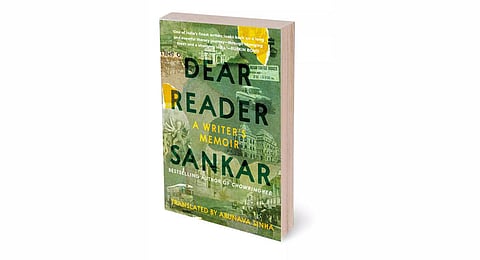

Manishankar Mukherjee’s life as a writer began when he decided to honour his deceased employer and the last British lawyer in the Calcutta High Court, Noel Barwell, by writing a book, since building a statue or naming a road after him weren’t feasible options. The result was the novel Kato Ajanare (The Great Unknown). Although he was dismissed by his peers as a ‘one-book wonder’, the author, fondly known as Sankar, persisted, continuing to churn one book after another.
It was, however, only after his novel Chowringhee was adapted by Pinaki Mukherjee into a blockbuster film starring Bengali actor Uttam Kumar, that Sankar became a well-known figure in the world of Bengali literature. Subsequently, Satyajit Ray too adapted two of his novels Seemabaddha and Jana Aranya into films in the 1970s.
Dear Reader: A Writer’s Memoir, originally published as Eka Eka Ekashi in Bengali and translated into English by Arunava Sinha, chronicles this chance rise of Sankar from being a clerk to Barwell to becoming one of India’s foremost Bengali authors, with a recognisable rambling yet endearing style of writing.
The writer, rather generously, devotes sections of the book to the women in his life––mother, grandmother, teachers––who inspired and impacted his literary career. The author also writes about his editor at Desh magazine, Sagarmoy Ghosh, in the chapter ‘Editor at Large’, who had been instrumental in making him the writer he is today.
Legendary literary figures such as Bibhutibhushan Bandyopadhyay, Shibram Chakraborty, Sunil Gangopadhyay, artist Bikash Bhattacharjee and Sharadindu Bandyopadhyay are written about with great reverence as contributors to the golden period of Bengali literature. Strangely, however, none of them is referred to as a favourite author, who influenced Sankar’s style, although the impact is evident. The way he writes about his father moving away from the family tradition of becoming a priest in the chapter titled, ‘Luchi or Khichuri?’, for instance, has feigned similarities with the way Bibhutibhushan wrote of his boy-hero Apu in Pather Panchali, giving readers a glimpse of how real life can be intertwined with literature. Which is why, it is no surprise that almost all of Sankar’s novels are semi-autobiographical.
A substantial part of the book is also dedicated to Kolkata, of which he became the Sheriff of in 2019. Here, the author writes about Howrah, where he spent his boyhood after relocating from Bongram in present-day Bangladesh as a refugee after Partition. As is the case with all translations, something is always lost. Perhaps, that is true of this work as well. Those who have read the original, which won the Sahitya Akademi award, will know, but as far as its soul is concerned, it remains intact. And that is what matters the most.
Dear Reader: A Writer’s Memoir
By: Sankar
Translated
By: Arunava Sinha
Publisher: Harper Collins
Pages: 320
Price: Rs 499